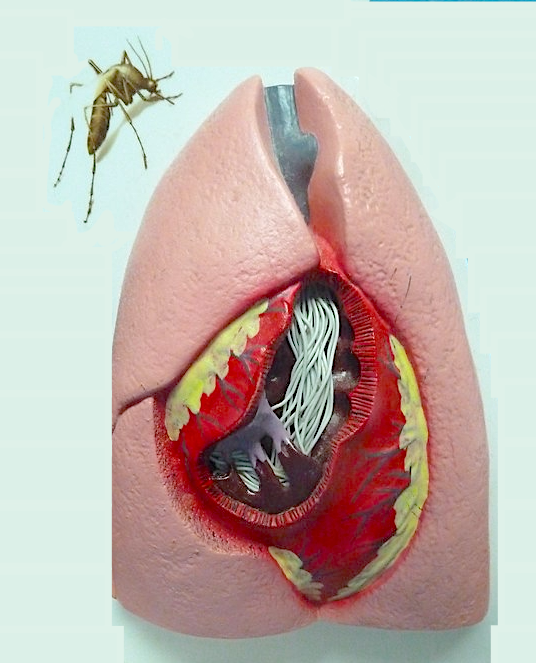 Of course no one “loves” worms, unless you’re a robin, that is. April is a month that traditionally brings more rain to herald May’s flowers, and with that rain comes an invasion of drowning worms (earthworms) to the delight of those robins. April also is Heartworm Awareness Month, and every pet parent needs to hear about heartworms and be familiar with the reasons to prevent their invasion into their baby’s bodies.
Of course no one “loves” worms, unless you’re a robin, that is. April is a month that traditionally brings more rain to herald May’s flowers, and with that rain comes an invasion of drowning worms (earthworms) to the delight of those robins. April also is Heartworm Awareness Month, and every pet parent needs to hear about heartworms and be familiar with the reasons to prevent their invasion into their baby’s bodies.
A refresher on heartworms helps you understand why it is so imperative to prevent their entry into your pet. Adult heartworms are 6 to 8 inch long, spaghetti-like parasites that live in major blood vessels in the lungs and in the right side of a dog’s heart. These “worms” take up a lot of space in these major vessels and chambers of the heart and commonly cause a cascade of events frequently leading to congestive heart failure and death. The adults breed and release baby heartworms called microfilaria into the bloodstream. Mosquitoes take a blood meal, and these ingested stage 1 larvae develop into stage 2 larvae in their salivary glands. The next time that hungry mosquito bites your dog or cat, those stage 2 larvae enter your pet’s bloodstream and quickly molt into stage 3 larvae. These stage 3 larvae live for about 5 to 6 weeks before continuing to molt into further stages. That time window is what allows a medication killing those stage 3 larvae to be given once a month. The life cycle continues for a total of 6 to 7 months, from mosquito bite to adult worms living in your dog’s heart and lungs.
The dog is the major host where heartworms like to live and thrive best, but heartworms can also survive in much smaller numbers and cause a different type of disease in cats–for which there is no treatment and which is frequently fatal. Even though cats contract heartworms much less often than dogs do, prevention in cats is even more important. So don’t forget your feline furry baby in your monthly preventive routine.
There are no outward signs of the damage caused by the heartworm’s presence in the early stages of the disease in dogs. Since giving a preventive medication in the presence of these parasites can potentially cause problems for your dog, a heartworm check blood test should always be performed prior to starting a preventive in an older (over 6 months of age) dog or when changing a type of preventive medication. No routine blood test is needed for cats unless signs of disease are present. Once again, your Heal House Call Veterinarian is your and your furry baby’s best friend.
Companies have developed several different drug products which target and kill stage 3 heartworm larvae, often combining mosquito repellent to further prevent your pet’s exposure to heartworms. While it is true that heartworm’s prevalence varies with geography, preventing an “ounce” of heartworms is much more cost effective than the “pound” of cure, since treatment for the adults is VERY expensive, both for your pocketbook and your nerves. Now you can see why it’s so important to give a monthly preventive all year round.
Not only can you prevent heartworm disease by giving medication year round, but several of these medicines include drugs that can kill and clear intestinal parasite infections as well. Your dogs and cats are continually exposed to these different intestinal “worms” and giving them a product once a month can treat or prevent both heartworms and intestinal worms. Your four-legged furry babies will definitely thank you for preventing that “invasion” of worms in April and all year round.
